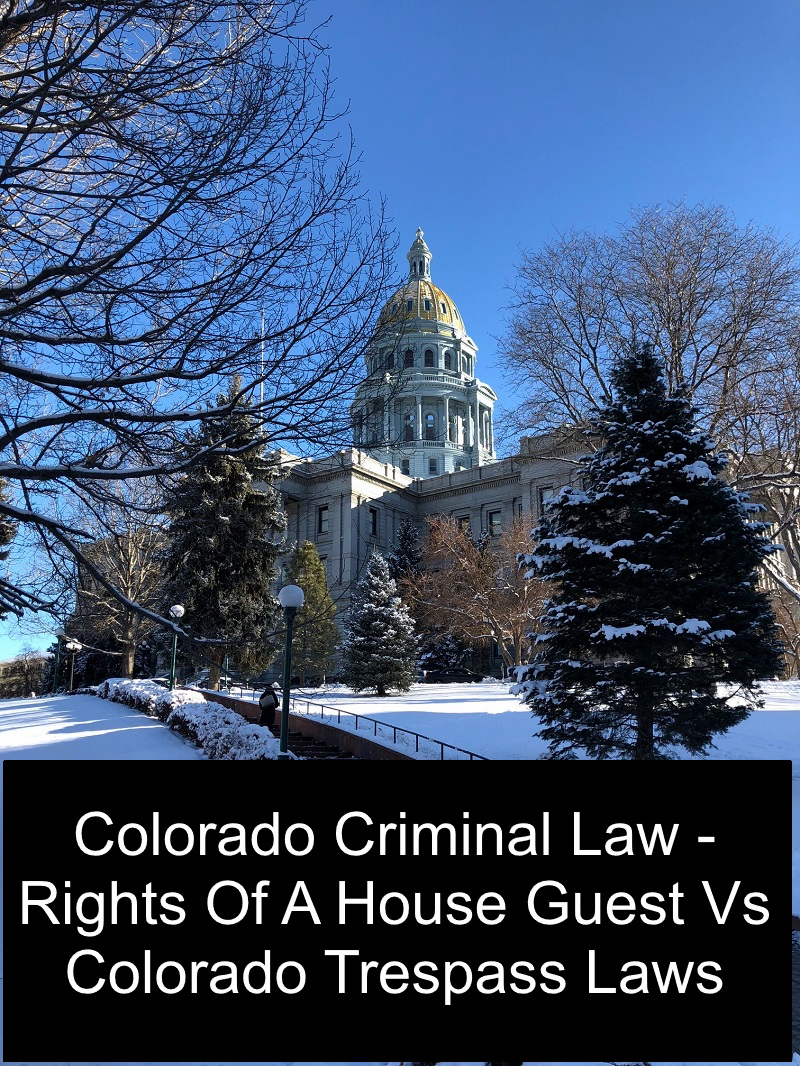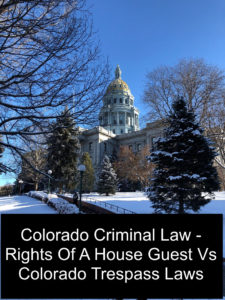By H. Michael Steinberg Colorado Criminal Violent Crimes Defense Lawyer – Attorney
Colorado Criminal Law – Rights Of A House Guest Vs. Colorado Trespass Laws
One of the most difficult situations the reader might find themselves in is forcing a guest to leave your home. The easy case is when a person has forced his way onto your property without your permission. The harder case is when a guest, invited by you to be present in your home, refuses to leave at your request.
As noted, a Colorado home owner or renter has the legal right to remove someone from their home even if they were first invited into the home. But this right may be the kind of right without a realistic remedy- meaning the actual mechanics of “removing” a “guest” is problematic.
How do you actually “remove” an unwanted guest? Can you use force? This author strongly suggests asking for the help of the police, (unless you are in imminent danger and must act in self defense), before taking the situation into your own “self help” hands.
Add to that issue the problem that “long term guests” may actually become “default” tenants under Colorado law, a situation where the law is somewhat unhelpful and is very unclear. While the Superbowl Sunday intoxicated and obnoxious and even violent guest you are forced to remove from your home is the easy case, Colorado law offers no clear “bright line” rules that assist the home owner or renter with understanding their rights in more complex “hold over” situations.
If you are an owner or renter of your home the law gives you the right to say who lives there. Additionally, even if you freely invited someone into your home, the law gives you the right to change your mind. But a guest can quickly “evolve” into a tenant (see below). If that ambiguity arises, your guest may be entitled to certain legal protections. This is true even if there is no lease agreement or for that matter ANY form of agreement between you and your house “guest.”
Finally, again “the rub,” is there is no easy legal way to MAKE someone leave your home if they refuse to leave. The practical aspects of self help evictions may actually place you in jeopardy of being charged with a crime if you make wrong decisions and illegally force an unwanted guest to leave your home.
Understanding Colorado’s Trespass Law 18-4-504
In Colorado, a person commits the crime of trespass by entering or remaining in a home or a building or on land without permission from the owner or resident. Absent the commission of a crime during the act of criminal trespass – most charged cases fall within the ambit of the crime of Third Degree Criminal Trespass law.
Third Degree Criminal Trespass Section 18-4-504(2)(b), C.R.S.
The elements of third degree criminal trespass are:
1. That the defendant,
2. in the State of Colorado, at or about the date and place charged,
3. unlawfully,
4. entered or remained,
5. in or upon any premises of another.
When Does A GUEST Become A Tenant With A Tenant’s Commensurate Rights Of Possession?
What follows is one of Colorado’s “key laws” that seems to add to the confusion in this area. Section 13-40-107 Notice To Quit law – (See Section Three (3) below)
Colorado Revised Statutes Title § 13-40-107 Notice To Quit
(1) A tenancy may be terminated by notice in writing, served not less than the respective period fixed before the end of the applicable tenancy, as follows:
(a) A tenancy for one year or longer, ninety-one days;
(b) A tenancy of six months or longer but less than a year, twenty-eight days;
(c) A tenancy of one month or longer but less than six months, seven days;
(d) A tenancy of one week or longer but less than one month, or a tenancy at will, three days;
(e) A tenancy for less than one week, one day.
(2) Such notice shall describe the property and the particular time when the tenancy will terminate and shall be signed by the landlord or tenant, the party giving such notice or his agent or attorney.
(3) Any person in possession of real property with the assent of the owner is presumed to be a tenant at will until the contrary is shown.
(4) No notice to quit shall be necessary from or to a tenant whose term is, by agreement, to end at a time certain.
(5) Except as otherwise provided in section 38-33-112, C.R.S ., the provisions of subsections (1) and (4) of this section shall not apply to the termination of a residential tenancy during the ninety-day period provided for in said section.
Colorado law presumes that your guest has the rights of a tenant, until the contrary is shown. So we move on to the next steps in the analysis.
The Police Will Not Help Unless The Situation Is Clearly A Trespass
Section 3 of 13-40-107 above, contributes mightily to the confusion in this area. Again, it reads as follows:
Because Colorado law affords little in the way of clear guidelines as to how long someone can stay as a “guest” before they are viewed as a tenant, the police, if called to assist will probably focus on the “totality of the circumstances” regarding each case.
For example, they may view a 30 day stay as a guest as one milestone for the conversion of that house guest into a tenant. There is much more, however, that goes into the analysis of this problem area.
The Easy Case For Colorado Criminal Trespass
The police have no issues removing a person that has placed you, your friends, or your family in danger or has committed a crime during an illegal trespass. If you are in imminent danger from your guest, or if there has been abuse and/or threats have been made against you, the police will not hesitate in removing the unwanted person.
But if you are not the victim of a crime and the “guest” is peaceful and is only contesting your right to throw them out by claiming they “reside” there, THEN you may actually be forced to file a “Notice to Quit” under § 13-40-107 (Colorado Notice To Quit Law).
If you are forced to follow the Colorado eviction process, believe it or not, your unwanted “guest” may have at least three days to vacate your home and if your “guest” STILL refuses to vacate the premises, then you may be forced to go to court and file a Summons and Complaint in a Forcible Entry and Unlawful Detainer action at the county courthouse to seek, and hopefully receive, receive a Court Order for your “guest” to leave.
Landlords, homeowners and renters cannot simply forcibly remove “tenants” as trespassers. There are strict laws and strict procedures that must be followed which include giving notice to the tenant, filing an eviction lawsuit, and then obtaining a final judgment from a court. After all of that it is the local sheriff that must actually enforce the court order for the eviction.
The Factors That May Persuade The Police To Remove Your Guest
If you are in the situation of the unwanted guest – what follows are some suggestions to help explain your situation to the police. Remember this, the police will NOT want to be placed in a situation where they must decide that your guest is, or is not, a tenant.
Be Clear About The Key Issue – This Person Is Not Wanted – NO Ambiguity Must Exist
You must, even before the police arrive, make sure that the trespasser knows that he or she is no longer welcome. There can be no ambiguity. One way to make this clear is tell all friends and relatives that may be present that you want the guest to leave.
While you may have previously given the person permission to stay at your house, you must make it clear – explicitly – that you want the person to leave.
After you have made it crystal clear that the guest is not welcome, and if the guest refuses to leave and continues to stay, THEN call the police and report the person for trespassing.
As noted, Colorado law IS clear that guests, are not tenants and are not entitled to the formal eviction process. However, the police have no way of discerning whether your guest is a trespasser or a tenant and may refuse to remove the person. They may believe that you are just trying to use them in a “self-help informal eviction process.
Why Are Colorado Police So Reluctant To Help You With Your Task Of Removing An Unwanted Person? What Can I Do To Persuade Them To Act?
Police officers have careers they wish to protect. If they forcefully remove someone that has the rights of a tenant – they may face a complaint or even a lawsuit. Therefore they will want as much evidence as you can muster to make certain they are on the right side the law.
The Police Do NOT Want To Make A Mistake And Enforce A Self Help Illegal Eviction
The police are not lawyers and are very wary of getting involved in domestic disputes or forcefully removing overstaying house guests. They have no way of knowing whether your guest is a trespasser or a tenant, so there primary default position will be to refuse to remove the “guest” without strong evidence that the person IS an unwanted guest.
The key question is this: has this person has established sufficient “roots” that they have attained a status different from the unprotected trespasser?
What follows are some areas of inquiry that may help in the process to persuade the police that this is an unwanted guest:
Ask:
- How did you extend the invitation to the guest?
- Did you make any promises when you made that invitation?
- Did you set up any conditions as to the length and terms of the stay?
- Did you request any form of compensation or financial contribution for the stay?
- How long a stay did you agree to when you extended the invitation or was it open ended?
- At the time you called the police – how long has your guest been there?
- Do you have a “relationship” with the guest that might support an inference that a longer stay would be expected?
Trouble Areas – Evidence Of Tenancy Rights
- Your guest pays rent or contributes to expenses in some way.
- Your guest receives mail at the property.
- Your guest spends consecutive nights at the property.
- Your guest has moved in furniture, their clothes and toiletries and their pets.
- Your guest has been there for a lengthy stay.
- Your guest uses the kitchen to prepare meals.
- Your guest has a key to the home and has a firm degree of control over the space.
- Your guest has not other residence or place to live and has made your home his or her dwelling for the time being.
Summary And Conclusion – Colorado Criminal Law – Rights Of A House Guest Vs Colorado Trespass Laws
No good deed…. If you allow someone to stay in your property because you are kind and you acted out of compassion – you may become very angry when that person turns out to be the biggest headache of your life. But be for warned, do NOT use violence to force them out of your home unless you are in immediate danger.
Contact the police and make your case with as much documentation and evidence as you can muster. Remember this – even the most innocent gesture of accepting money, food, assistance or allowing your guest to receive mail at your home may create a landlord-tenant relationship. If that happens, your unwelcome “house guest” may become legally entitled to full protection of the Colorado eviction process.
Colorado Criminal Law – Rights Of A House Guest Vs Colorado Trespass Laws
If you found any of the information I have provided on this web page article helpful please click my Plus+1 or the Share buttons for Twitter and Facebook below so that others may also find it.
The contents of this article are based upon my research, my personal experience and my personal analysis and opinions developed from my thirty six years (as of 2018) of criminal trial experience from both sides of the courtroom – as a former career prosecutor for Arapahoe and Douglas Counties (13 years) and as the owner of my own Criminal Defense Law Firm since 1999 (19 years).
The reader is also admonished that Colorado criminal law, like criminal law in every state and at the Federal level, changes constantly. The article appearing above was accurate at the time it was drafted but it cannot account for changes occurring after it was uploaded.
If, after reading this article, you have questions about your case and would like to consider retaining our law firm, we invite you to contact us at the Steinberg Colorado Criminal Defense Law Firm – 303-627-7777.
Never stop fighting – never stop believing in yourself and your right to due process of law. You will not be alone in court, H. Michael will be at your side every step of the way – advocating for justice and the best possible result in your case. H. Michael Steinberg is passionate about criminal defense. His extensive knowledge and experience of Colorado Criminal Law gives him the edge you need to properly handle your case
 ABOUT THE AUTHOR: H. Michael Steinberg – Email The Author at:
ABOUT THE AUTHOR: H. Michael Steinberg – Email The Author at:
A Denver Colorado Criminal Defense Lawyer – or call his office at 303-627-7777 during business hours – or call his cell if you cannot wait and need his immediate assistance – please call 720-220-2277.
“A good criminal defense lawyer is someone who devotes themselves to their client’s case from beginning to end, always realizing that this case is the most important thing in that client’s life.”
You should be careful to make a responsible choice in selecting a Colorado Criminal Defense Lawyer. We encourage you to “vet” our firm. Over the last 36 plus years – by focusing ONLY on Colorado criminal law – H. Michael has had the necessary time to commit to the task of constantly updating himself on nearly every area of criminal law, to include Colorado criminal law and procedure and trial and courtroom practice.
Putting more than 36 years of Colorado criminal defense experience to work for you.
H. Michael works hard to get his clients the best possible results in and out of the courtroom. He has written, and continues to write, extensively on Colorado criminal law and he hopes this article helps you in some small way – Colorado Criminal Law – Rights Of A House Guest Vs Colorado Trespass Laws.

